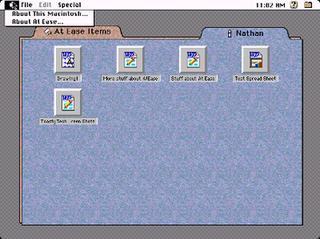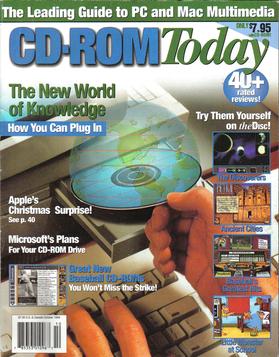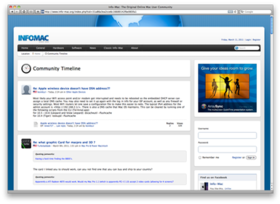
A bulletin board system (BBS), also called a computer bulletin board service (CBBS), was a computer server running software that allowed users to connect to the system using a terminal program. Once logged in, the user can perform functions such as uploading and downloading software and data, reading news and bulletins, and exchanging messages with other users through public message boards and sometimes via direct chatting. In the early 1980s, message networks such as FidoNet were developed to provide services such as NetMail, which is similar to internet-based email.

HyperCard is a software application and development kit for Apple Macintosh and Apple IIGS computers. It is among the first successful hypermedia systems predating the World Wide Web.
Shareware is a type of proprietary software that is initially shared by the owner for trial use at little or no cost. Often the software has limited functionality or incomplete documentation until the user sends payment to the software developer. Shareware is often offered as a download from a website. Shareware differs from freeware, which is fully-featured software distributed at no cost to the user but without source code being made available; and free and open-source software, in which the source code is freely available for anyone to inspect and alter.

Mac OS 9 is the ninth and final major release of Apple's classic Mac OS operating system, which was succeeded by Mac OS X 10.0 in 2001, starting the Mac OS X family of operating systems. Introduced on October 23, 1999, it was promoted by Apple as "The Best Internet Operating System Ever", highlighting Sherlock 2’s Internet search capabilities, integration with Apple's free online services known as iTools and improved Open Transport networking. While Mac OS 9 lacks protected memory and full pre-emptive multitasking, lasting improvements include the introduction of an automated Software Update engine and support for multiple users.

System 7 is the seventh major release of the classic Mac OS operating system for Macintosh computers, made by Apple Computer. It was launched on May 13, 1991, to succeed System 6 with virtual memory, personal file sharing, QuickTime, TrueType fonts, the Force Quit dialog, and an improved user interface.
MkLinux is an open-source software computer operating system begun by the Open Software Foundation Research Institute and Apple Computer in February 1996, to port Linux to the PowerPC platform, and Macintosh computers. The name refers to the Linux kernel being adapted to run as a server hosted on the Mach microkernel, version 3.0.

Connectix Corporation was a software and hardware company that released innovative products that were either made obsolete as Apple Computer incorporated the ideas into system software, or were sold to other companies once they became popular. It was formed in October 1988 by Jon Garber; the dominant board members and co-founders were Garber, Bonnie Fought, and close friend Roy McDonald. McDonald was still Chief Executive Officer and president when Connectix finally closed in August 2003.

At Ease was an alternative to the Macintosh desktop developed by Apple Computer in the early 1990s for the classic Mac OS. It provided a simple environment for new Macintosh users and young children to help them to work without supervision. At Ease replaces the Finder desktop, providing a simple tabbed panel-oriented graphical user interface in which applications and documents are represented by icons on large buttons. Aside from its security features, its interface and basic functionality is very similar to the Packard Bell Navigator.

Walnut Creek CDROM Inc. was an early provider of freeware, shareware, and free software on CD-ROMs. The company was founded by Bob Bruce in Walnut Creek, California, in August 1991. It was one of the first commercial distributors of free software on CD-ROMs. The company produced hundreds of titles on CD-ROMs, and ran the busiest FTP site on the Internet, ftp.cdrom.com, for many years.
MODE32 is a software product originally developed by Connectix for certain models of the Apple Macintosh. It was published in June 1991 and originally cost US$169; however, on September 5, 1991, the software was made available free to customers under licensing terms with Apple Computer.
WebSTAR was a web server application for the classic Mac OS. It supported the common gateway interface (CGI) and its own AppleEvents-based W*API for plug-in support, as well as SSL and similar technologies used in most early web servers. Unlike most servers of the era, WebSTAR was very Mac-like in terms of installation and maintenance, using a number of AppleEvents-based MacOS programs for most tasks. WebSTAR was also part of Apple's Internet Server Solution, a package of internet server software and certain models of PowerMac machines. One popular use of WebSTAR was in combination with FileMaker to make simple database-driven online applications.
Inside Mac Games (IMG) started in 1993 as an electronic magazine about video games for the Mac. It was distributed on floppy disk, then CD-ROM, and eventually became a website.
OldVersion.com is an archive website that stores and distributes older versions of primarily Internet-related IBM PC compatible and Apple Macintosh freeware and shareware application software. Alex Levine and Igor Dolgalev founded the site in 2001.
Connect Business Information Network, formerly known as MacNET, was a proprietary dial-up online network with a graphic user interface similar to AppleLink.

CD-ROM Today was an American magazine targeted at computer users. Published from 1993 to 1996 by Imagine Publishing, the magazine was initially issued once every other month, before becoming a monthly. Each issue included software and hardware reviews, as well as a CD containing fonts, video and text files, system updaters, freeware and shareware and demo versions of commercial software. Products were included for both Macintosh and Windows PC.
InterCon Systems Corporation was founded in April 1988 by Kurt D. Baumann and Mikki Barry to produce software to connect Macintosh computers in environments that were not Macintosh-exclusive. At the time, there was no real concept of the Internet and there was still a question of whether the TCP/IP protocols or OSI protocols would be adopted widely. Over the next 9 years, the company grew from three employees to over 100 and sold software in the US, Europe and Japan.
Ircle was an IRC client developed by Onno Tijdgat for the Macintosh computer platform. Ircle was shareware, with free upgrades. The client was scriptable with AppleScript, supported multiple channels and servers, and up to ten simultaneous connections. It was discontinued in 2009. Since 2012, Ircle was not compatible with most recent versions of OS X, and no updates were available. In December 2017 the Ircle home page displayed a poll, to end Q2 2018, to determine whether a new version should be released on OS X and iOS. The results of the poll were 311 votes in favor of a new Mac OS version, 43 votes for an iOS version, and 117 votes for both a Mac OS and iOS version, out of 528 votes cast.

Mac OS is the series of operating systems developed for the Macintosh family of personal computers by Apple Computer, Inc. from 1984 to 2001, starting with System 1 and ending with Mac OS 9. The Macintosh operating system is credited with having popularized the graphical user interface concept. It was included with every Macintosh that was sold during the era in which it was developed, and many updates to the system software were done in conjunction with the introduction of new Macintosh systems.
Semaphore Corporation was a company notable for being the first to provide public access to selected U.S. Postal Service databases, and for its early computer publications in the 1980s.









